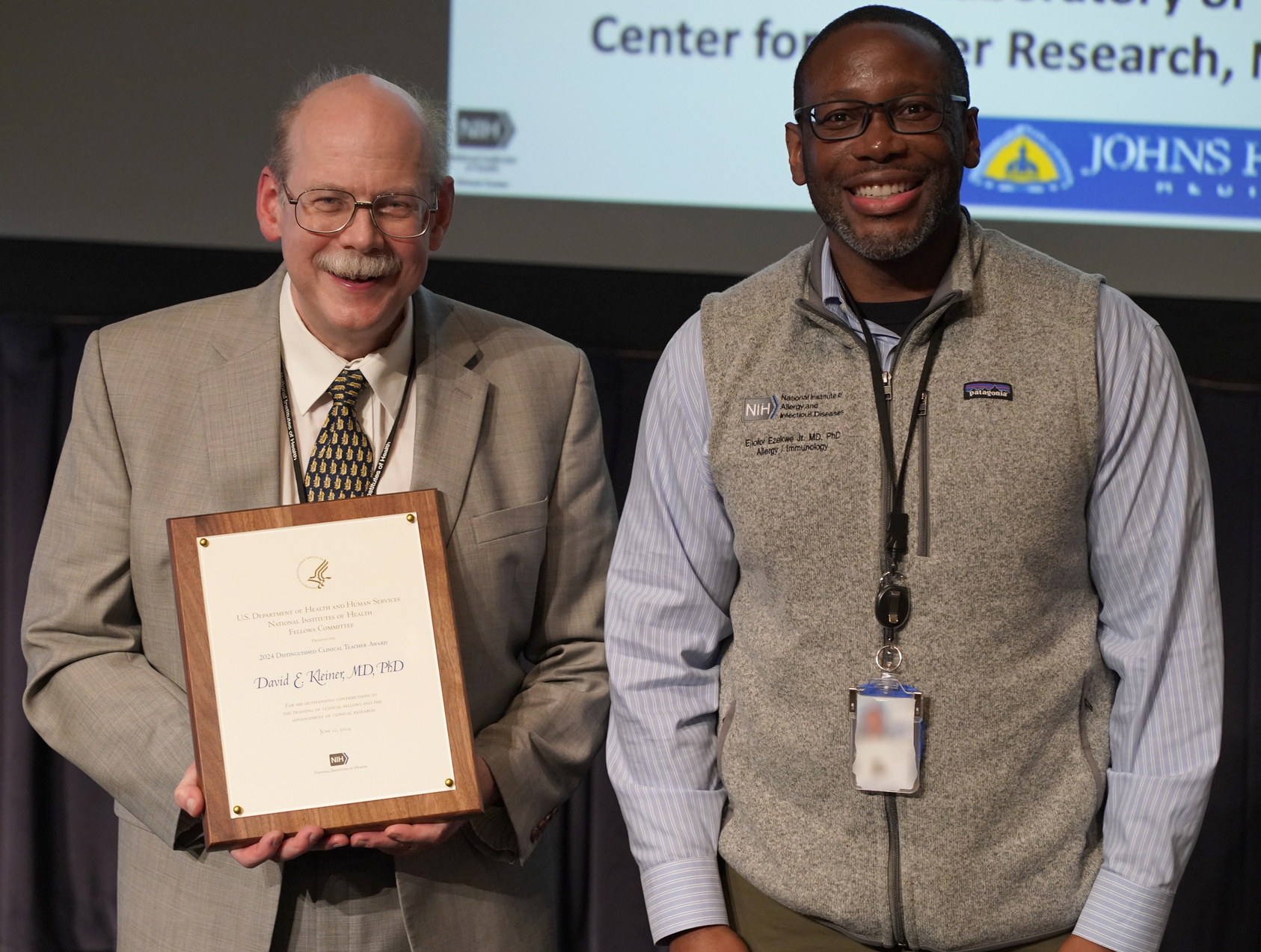Delivering the 20th Annual John Laws Decker Memorial Lecture at the NIH Clinical Center, the Esteemed Pathologist and Teacher Shared an Insider's View of Groundbreaking Research Into Steatotic Liver Disease
 Dr. David Kleiner receives 2024 NIH Distinguished Teacher award from Dr. Ejiofor Ezekwe.
Dr. David Kleiner receives 2024 NIH Distinguished Teacher award from Dr. Ejiofor Ezekwe.
Nearly a third of the world’s population is affected by steatotic liver disease, a disorder characterized by liver fat, inflammation, cellular ballooning, and fibrosis (or scar tissue) that progressively degrades liver function.
The disease has become increasingly common as the world’s population grows more obese and diabetic and can remain undetected for decades before symptoms appear.
Dr. David Kleiner, an esteemed pathologist and a senior research physician at the National Cancer Institute, offered an inside view of 25 years of groundbreaking research.
Winner of the 2024 NIH Distinguished Teacher Award, Kleiner presented the 20th Annual John Laws Decker Memorial Lecture at the NIH Clinical Center in June, a highlight of the Clinical Center’s Grand Rounds Great Teachers Series.
Kleiner shared his insights as a pathologist deeply involved in efforts to understand the little-known disease and discover treatments, tracing the history of the disease and the research innovations and clinical trials that led to the first drug approval to treat the disease earlier this year.
Pointing to a landmark 1980 paper by Juergen Ludwig in the Mayo Clinic Proceedings, Kleiner noted a key contribution—Ludwig gave the disease a name: non-alcoholic steatohepatitis.
(Also known as fatty liver disease, the disease was renamed in 2023. Its iterations are now referred to as metabolic dysfunction-associated steatotic liver disease [MASLD] and metabolic dysfunction-associated steatohepatitis [MASH].)
"Anyone who has an illness that does not have a name will tell you how important it is to treating a disease," Kleiner said.
An international expert on chronic liver disease, Kleiner’s role in the story began 18 years later, during the first workshop on non-alcoholic steatohepatitis (NASH) in 1998. Convened by the National Institute of Diabetes and Digestive and Kidney Diseases, the workshop led to the establishment of the NASH Clinical Research Network in 2000.
Kleiner helped lead the network’s Pathology Committee, which among other key contributions, developed a scoring system for microscopic analysis of liver biopsies.
The system converted visual observation data on liver cell fat, ballooning, inflammation, and scaring (or fibrosis) into numerical data open to statistical analysis.
It enabled hundreds of NASH CRN and extramural research studies, allowing researchers and physicians to assess and track progression of the disease and providing the foundation for clinical trials.
In all, Kleiner and his NASH CRN Pathology Committee colleagues published 17 studies, made significant contributions to 126 other NASH CRN papers, and reviewed and scored nearly 7,000 liver biopsies.
Their work supported five clinical trials testing potential drug interventions, with a sixth clinical trial currently nearing completion.
In March, the FDA announced the approval of the first drug treatment for patients with liver scarring due to fatty liver disease, or nonalcholic steatotic hepatitis.
Kleiner noted that three other drugs are currently in Phase 3, or final, trials and predicted many more to come.
"This is a really impactful disease and one we need to pay quite a bit of attention to," Kleiner said. "Most people will die with the disease instead of from it."
Kleiner added that it was important to understand the natural history of the disease "so that we can focus on the people who will suffer."
- Sean Markey

